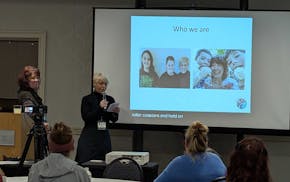Rod was reading a Wall Street Journal story titled "Inside Swiss Banks' Tax-Cheating Machinery" when he came across this sentence:
"The offenders range from international banks to small-town mortgage lenders, which together helped secrete more than 10,000 U.S.-related accounts holding more than $10 billion."
Rod was "left wondering" what it was that the Swiss banks were able to secrete. "Maybe it was liquid assets," he wrote. Yuck.
Then in another Associated Press story titled "Texas girds for deluge as Patricia spares Mexico," Rod read about the Union Pacific freight train that derailed about 50 miles south of Dallas because a flooded creek had washed away the tracks. According to Jeff DeGraff, a railroad spokesman, "[Crew members] escaped the train after it stopped and swam to high ground."
"I know that trains can do a lot of things these days," Rod wrote, "but I certainly didn't know they could swim to high ground! But I suppose I can't be too hard on the Associated Press since they were quoting someone."
And in another AP story about a treasure trove of late Triassic fossils found in Dinosaur National Monument in Utah, Rod read about "a type of a strange-looking reptile with a head like a bird, arms like a mole and a claw on the tip of the tail called a drepanosaur."
"It's great that they told us the name of the creature's claw," he wrote, "but what was the creature itself called?"
Thanks, Rod, for reminding us of the importance of proofreading for typos and ambiguous sentence structures.
To make clear the intended connections, revise "[Two crew members] escaped the train after it stopped and swam to high ground" to "[Crew members] escaped the train after it stopped and they swam to high ground" or to "[Crew members] escaped the stopped train and swam to high ground." Similarly, revise "a strange-looking reptile with … a claw on the tip of the tail called a drepanosaur" to "a strange-looking reptile called a drepanosaur with … a claw on the tip of the tail." It's all about the connections, as Meghan Trainor might say.
"Three great errors in one day!" Rod wrote.
Chuck, who officiates high school sports, had an even better day, "an interesting education moment," he called it.
When refereeing a JV game, he saw "a player block his opponent to the ground and continue to push him down." When he threw the flag for a holding foul, the following dialogue ensued:
"I didn't foul him," protested he player. "I was just laying on him."
"Lying," Chuck corrected.
"Lying on him," said the player.
Then the coach called from the sideline, "That's no foul; he was just laying on him."
"Lying," said the player.
Doesn't Chuck's story warm your heart? English majors everywhere should be celebrating.
On the other hand, when a teenager told 75-year-old Ginger, "Me and him went out," Ginger told her, "You should always put the other person before yourself," to which the teenager replied, "Well, OK, then. Him and me went out."
Stephen Wilbers offers training seminars in effective business writing. E-mail him at wilbe004@umn.edu. His website is www.wilbers.com.

U.S. Bancorp executive stopped responding to control tower minutes before Brooklyn Park crash

Minneapolis condo in historic Midtown Exchange building listed for $205,000

RFK Jr.'s controversial comments draw ire at Minnesota autism convention

Big medical expenses drove $176 million operating loss last year at Medica

